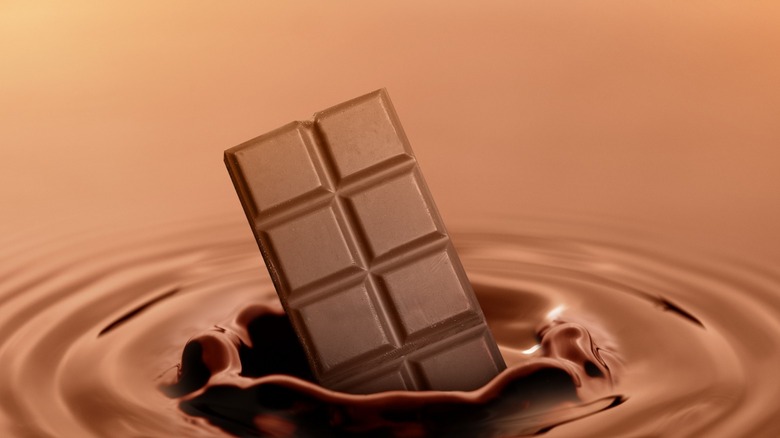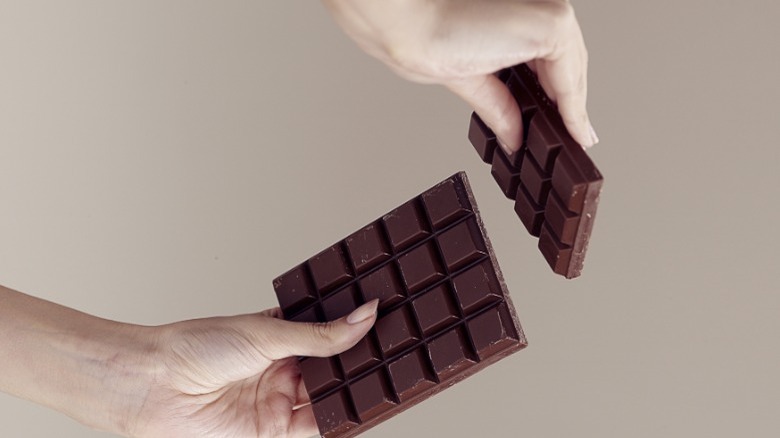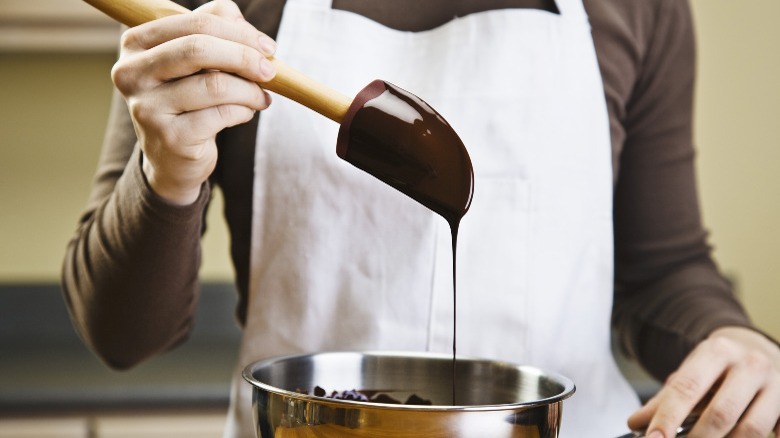The Unexpected Trick To Tell If Chocolate Is High Quality
Ah, chocolate! It's craved by people of all ages, from toddlers wheedling their parents for candy at the grocery store to elderly receptionists who keep a bowl of Hershey's Kisses on their desks. It can be light and fresh or dark and bittersweet. Lovers use boxes of the stuff to show their devotion; mysterious candy factory owners use it to teach moral lessons to horrible children, and Juliette Binoche used it to win over stuffy French townsfolk in that one movie your mom liked. Simply put, it's one of the most beloved foodstuffs in world history.
But what separates the good from the great, the inexpensive treats from the decadent indulgences? Price points, branding, and plain common sense are a start – give a girl you're trying to woo a 3 Musketeers bar from the corner store and see where it gets you – but they can only take you so far. If you truly want to discern high-quality chocolate, you have to know more about chocolate itself: how it should be made, how it should taste, and, surprisingly, how it should sound. And the only way to find out that last part is to break the chocolate yourself.
Snap your chocolate in half and listen
One way to tell if you're dealing with a quality chocolate bar is to break it in half, or at least break off a piece. When you do so, listen carefully: you're looking for a sound that's not unlike a finger snap. One, two, three, break. Did you hear it?
If you did, that means you've got a good piece of chocolate on your hands. If you're eating dark chocolate, that snap is going to be especially pronounced due to the high percentage of cocoa it contains compared to its milk and white counterparts. (Dark chocolate is 50-90% cocoa, while milk chocolate is 10-50% cocoa and white chocolate contains no cocoa solids at all.) But no matter what kind of chocolate you have, there should be at least a little bit of snappage. What you don't want is chocolate that bends instead of breaks. If it doesn't snap immediately, or if it gets brittle and crumbly, that means the chocolate is not in temper.
What Does It Mean for Chocolate to Be In Temper?
A chocolate's temper has nothing to do with whether it might start cursing at other drivers in a traffic jam. In fact, it refers to a piece of chocolate's structural integrity. When chocolate is heated and then cooled, it allows the fat molecules to crystallize into a solid. How well chocolate is tempered will determine how it looks, how quickly it melts, and how it feels in your mouth.
A well-tempered piece of chocolate is glossy like an ad in a magazine, doesn't immediately start to melt in your hands, and is smooth and rich in your mouth. The more solids you add to the chocolate, the harder it is to temper; that's why milk and white chocolate don't snap quite like dark chocolate. But that doesn't necessarily make them low-quality. The real cause for concern is if there are other solids added in order to dress up a disappointing product: additional sugars, vegetable oil, preservatives, and so on. That's what makes low-quality chocolate dry, crumbly, and overly flexible – and that's what you want to avoid, no matter what type of chocolate you have.


